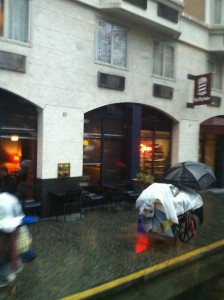The Good, The Bad and The Ugly in San Francisco
 The Financial District of San Francisco is a weird place. There are two worlds co-existing there.
The Financial District of San Francisco is a weird place. There are two worlds co-existing there.
What do you visualize when you hear Financial District?
I don’t know about you, but when I think of a Financial District I visualize tall shiny buildings, sparkly sidewalks, men in expensive suits and ties and women in tasteful dress suits and high heels with attaché cases in their hands, quickly racing around the city trying to get from one place to the next, acting like the world is going to end. It’s a fast paced environment that is full of some of the top earners of the Bay Area, actually of the world. It’s also a spectacular place filled with beautiful tall buildings.
I’m now part of that world, minus the high heels. I don’t do high heels, especially on cement. I also don’t do tasteful dress suits, but I’m digressing. If I had it my way I’d be wearing jeans and flip flops to work everyday and bringing my dog with me. But… I don’t have it my way.
I take the bus to work every morning. I arrive to the Financial District between 7:00 – 7:30 AM everyday. Some mornings it is still dark when I arrive. There’s a side of the Financial District that not everyone knows about. The financial district is home to many homeless people.
Early in the morning, when I arrive, there are people sleeping in the doorways of the buildings. The only thing protecting them from the rain and cold temperatures are the cardboard boxes they’re laying under. This is always a wake up call for me…
I’ll be sitting on the bus grumbling to myself, saying things like, “it’s not fair, why do I have to get up so early”, “this sucks, I’d rather be working from home” and a bunch of other negative chatter that runs through my mind during the wee hours despite my best efforts to stay positive and focus on what I’m grateful for.
Often while the negative cassette tape is on full repeat in my head, I will turn and look out the bus window and catch a homeless person at their first stirrings of the morning. I’ll see a little stretch, or see someone sit up and rub their eyes, or see someone gathering all of their belongings. When I see this, the cassette tape in my head makes that horrible squeely noise that cassette tapes makes and starts spinning out of control and the tape is left laying in a big mess in my head. (I know I am dating myself here… I don’t even think my kids know what that noise is.)
On the days when I arrive earlier, the streets often smell like urine. I’ve even accidentally stepped in vomit. While I was looking at my practical, yet stylish (not high heeled) business shoe with vomit on it, a homeless man quietly said sorry to me. I almost cried thinking how his situation is so much harder than mine. I said, “I hope you feel better” and went on my way.
Did you know that there are people who clean those streets every morning to keep them shiny and sparkly for the rest of us? Is it strange that we can afford to hire people to scrub our streets every day but we can’t afford to shelter the homeless people? We can afford to put up massive Christmas decorations, but we can’t afford to feed these people? and I include myself in the “WE”.
My office building located in the heart of San Francisco’s Financial District is doing a food drive. We have a big barrel in the lobby collecting cans. I can’t even remember to bring the cans in.
I don’t have any answers. I just know it’s a mind-f@#$ going to work everyday in the financial district. I hate that in our so called “first world country” our streets are filled with people sleeping on them because our shelters are too full or too dangerous.
I wish I had something inspirational to end this post with but I don’t. I love San Francisco! I think it is one of the most magical and amazing cities in the world. San Francisco is filled with love and acceptance. I think it is important to sometimes think about the not so magical parts of San Francisco because maybe if we do we will come up with a solution.
Here are some resources for the homeless and hungry in San Francisco:
*Cassette tape image by Flickr user INDEED





There are no answers, unfortunately. People don’t really “see” the homeless, they only see the dirty smelly man. I have to admit that I catch myself sometimes thinking “why don’t they just find a job” or “get up and go do something” but what? Would you hire them like they are now? Many are mentally ill. It’s tough. We see it here in Austin as well, they live under the overpasses or in the parks before they get run off. There aren’t any REAL social initiatives to help those folks. If they put as much money into these types of problems as they do the useless war on drugs (seriously, we should just legalize and tax some of it at this point, but well..)… anyway… yeah. It’s sad that we allow people to “live” like that.
Hi Sally,
I’ve had a couple of jobs in the Financial District, one in 1984, the other in 1997, and as always, the more things change the more they remain the same. Your description of the District in 2010 could be identically applied to 1984 or 1997. The only difference is that it’s a lot less “financial,” what with the theft of Bank of America by NCNB, the demise of the Pacific Stock Exchange, and the downsizing of other financial institutions that comprised “Wall Street West.”
I’ve had a lifelong conundrum in considering the homeless. A surprising proportion of them are in such a condition by choice, yet how can one make the distinction? Many are on the streets due to extraordinary financial hardship, some allowed substance abuse to escort them to the cardboard apartment, others are tragically afflicted by a psychiatric disorder for which they did not ask. Even a moderate libertarian such as myself cannot comprehend why this republic can heap billions of dollars (mostly borrowed) upon a plethora of unreliable “allies” in order to buy their fickle loyalty, and simultaneously allow so many of its citizens to tread the waters of destitution under the rubric of an outmoded “bootstrap” mentality.
I don’t expect any easy answers, Sally. I suppose I expect political courage from those whom we elect to carry out our collective wishes.
Merry Christmas, Sally!
Really nice piece Sally.
Thanks for your comments. When it is really cold out, like today and I’m walking from the bus to my office and I catch myself complaining… I always stop myself and think of the person who only had cardboard boxes as cover last night.
Hey Sally,
Great blog. I just moved to SF and your observations are spot on. Here in the city, I work in the Financial District. I also volunteer on a semi-weekly basis at Glide Memorial, a church/community center that provides 3 free hot meals per day to anyone who wants them. Lots of people, many of them homeless and with severe drug/psychological issues, come in and the food, which is either donated or bought using monetary donations, is surprisingly good (roasted chicken on sunday, fish sometimes, lots of good veggies and fruit). Thus, in a lot of ways, I find the amount of people begging for change not as much a reflection of a lack of resources provided by the city, but rather a choice made by the poor to be in that position. Since there is free food handed out daily by Glide, I assume that the money which people are begging for must be for other things, most likely drugs or alcohol. I therefore find the number of panhandlers inexcusable.
And what’s worse is that, since I’ve started volunteering at Glide, I’ve been going around informing the beggers I see about Glide, telling them that they needn’t beg for there is free food available any time they want it. And the response is generally negative, thereby confirming my hypothesis that the money being begged for is not for food or other necessities of life. It makes me angry often how the homeless basically dupe tourists into thinking they’re doing a good thing by giving money to a homeless person in order to by him/her food, when really that money probably goes to support some other habit or addiction.
Anyway, great piece, but I don’t think the blame falls on the city for its lack of providing resources for the homeless. I think that the homeless actually have a better time here than in a lot of other cities because they can get money and free meals. This is inexcusable and very angering.
Jon,
Thank you for volunteering at Glide.It’s a great organization.
I’ve been asking people on Twitter and Facebook to define “home”. I’m working on another post as a follow up to this one. It’s a challenging subject.
Hi, Sally!
I used to work south of Market, both down 7th street a few blocks, and just off of Market on 3rd. On 7th street I’d routinely step over people passed out on the sidewalk in the mornings.
No mistake, our homeless support system is overstressed. I’m heavily involved in volunteering for some parts of COTS here in Petaluma. With that experience, and with my experience working in the city, I’d say that most of the people you’re running into are picking and choosing the services they decide to avail themselves of. Services are definitely out there for people to better themselves, and many of them have room.
Is that “homeless by choice”? Maybe. Is addiction a choice? If you’ve been in and out of shelters because one of the rules of the shelter is that you’ve gotta stay clean, is that a choice?
Is a severe case of anxiety stemming coupled with traumatic childhood experiences such that you can’t bring yourself to take medication to keep that anxiety in check, or get yourself to the doctor enough to get certified for SSDI, a choice? I think it isn’t, really, but cast in another frame it’s a person who won’t keep their appointments with a physician that’s being covered, with transportation available, and it starts to look like a choice.
And involuntary commitment is a really difficult problem. In my years in Tennessee I heard a number of horror stories from young adults who were struggling to keep their parents from having them committed because they’d strayed further from the church and other restrictive social structures than their parents wanted.
In gray areas such as these I think there’s a lot of room for different narratives to describe the situation. Multiple stories can accurately fit the facts, the question is which are we going to work within.
And my experience of the mental health community, especially psychiatry and psychology, is that has very few answers. So without actual tools to help the hardest cases off their dependencies the question becomes do we warehouse them, or do we sigh, carry on, and hire people hose down the streets in the morning?
Wow Dan, thank you for your thoughtful post.
I’ve really been struggling with how to respond to all the comments.
I don’t have any answers and I wish I did.
I did pose the question on Twitter & Facebook what does ‘home’ mean to you or how would you define ‘home’. I’ve been getting some very interesting answers and plan to form the answers in to a coherent followup to this post at sometime.
Many people have answered my question with “home is where the heart is”. But what does that mean?
I have to say this thought keeps going through my head…
“if home is where the heart is, does that mean a homeless person has a broken heart?”
🙁
One of the things that drives me nuts about modern philosophy is something called “Positive Liberty” (well, lots of stuff drives me nuts about philosophy as a discipline, mostly because I’m a computer programmer who’s driven to find logic in systems, and as soon as I start talking to philosophers I start rolling my eyes at many of their premises. But I digress).
It bothers me because it’s based on the notion that by restricting individual freedoms we can offer people the opportunity to live up to their potential.
The problem is that as soon as we start down that road, the collective notion of “their potential” can become our view of their potential. And that, to me, is a very dangerous slope, because that isn’t always a lower bound, sometimes it’s an upper bound. And sometimes it’s a personal bound (“When are you going to have children?”, etc).
Several times in my volunteer work I’ve had to say “these are the consequences of your choice, I’d really like you to take this path, but you have to be the one willing to do the hard work.” And it can hurt like hell when the decision gets made the other way, but I’ve also learned, over the years, that I can’t save the world. Sometimes, I have to let things fall where they will.
So to those people living on the street South of Market, consider the life they might have had without the city there, back when humans lived off the land. Many of them are already older than the average life expectancy of such a situation. They’d have not had the infrastructure of people trying to provide them with a warm shelter when the environment was too hostile to sleep outside, nor the excess of food, no matter the quality of the calories, in our society. Frankly, most of them would be dead, but by living off the spoils of our civilization they’re alive.
Are we then callous to hose down the sidewalks and step over them when they’re drunk?
I don’t know. And similarly, I don’t know when it’s right to say “your choice” and when it’s right to say “you are going to take a deep breath, turn around, and walk in to that appointment with the psychiatrist, no, I have no right to threaten you, but I hope you’ll thank me later”, I just play that one by ear.
But I do know that I’ve stopped beating myself up about not being able to save the world.
Sorry, I don’t have any answers either, just more questions. And as I said before, my experience is that the mental health profession, having come from the legacies of either encouraging the neuroses of rich people to get them to pay for friendship (ie: Freud and Jung) or strapping people down and torturing them to extract the demons (sanitariums) hasn’t really come to that many powerful tools either. So I’ll keep making my decisions as they feel right at the moment.
On the notion of “home”, I think it’s defined more by the people we surround ourselves with than the structure which keeps the environment out. In that sense those who’ve been sleeping on the sidewalks for years may not be homeless, and people in houses might be.
nobody wants to be homeless. our government has it priorities so backwards. President Obama just signed a new budget for pentagon this of $780 billion dollars, realistically $1 Trillion when you add up actual costs of our military adventures around the world. It was that ass Ronald Reagan who sent thousands of mentally ill people out on the streets during his too long time as president.
what about cutting the pentagon budget by just 1 percent. I bet $7.8 billion dollars would almost eradicate homelessness in this country. And while we are at it, how about another 1 percent cut to save our crumbling education system , so that todays kids may have a chance for a decent future,and ability to compete with children from other countries for jobs.